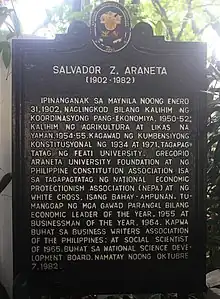Salvador Araneta | |
|---|---|
| Secretary of Agriculture and Natural Resources | |
| In office March 10, 1954 – 1955 | |
| President | Ramon Magsaysay |
| Preceded by | Placido Mapa |
| Succeeded by | Juan G. Rodriguez |
| Personal details | |
| Born | Salvador Araneta y Zaragoza January 31, 1902 |
| Died | October 7, 1982 (aged 80) |
Salvador Araneta y Zaragoza (January 31, 1902 – October 7, 1982) was a Filipino nationalist, constitutionalist, politician, civil servant, lawyer, educator, economist, businessman, industrialist, environmentalist, and philanthropist.
He was a member of the Philippine Constitutional Convention of 1933 and 1971 and founder and twice president of the Philippine Constitution Association. Araneta served as Secretary of Economic Coordination under President Elpidio Quirino, Secretary of Agriculture under President Ramon Magsaysay, and as member of the National Economic Council. He is the second son of Gregorio Araneta y Soriano and Carmen Zaragoza y Roxas. His father was a close colleague of Trinidad Pardo de Tavera since he belonged to the Partido Federal, a group in favor of American annexation of the country.[1]

As an educator, he founded Gregorio Araneta University Foundation, the first private agricultural school after World War II, endowed the university with one sixth of his personal wealth and turned it into a foundation. He also founded FEATI University to train engineers and mechanics for Far Eastern Air Transportation, Inc., the first airline that operated after the war serving China and San Francisco. Araneta pioneered in the flour industry (RFM Corporation), in soy bean extraction (Republic Soya), in the manufacture of electric motors (Feati Industries), animal feeds (AIA Feed Mills), animal vaccines (AIA Biological Laboratories). He was co-founder of NEPA (National Economic Protectionism Association), PRRM (Philippine Rural Reconstruction Movement), and the White Cross, an orphanage.
Araneta dedicated his life to uplift the moral and social values of society and sought property ownership and capitalism for all. These he embodied in a draft constitution, the Bayanikasan Constitution published in 1980 to be adopted in 10 to 20 years.
External links
References
- ↑ Claudio, Lisandro (2017). Liberalism and Postcolony: Thinking the State in the 20th Century Philippines. Ateneo de Manila University Press. p. 48.